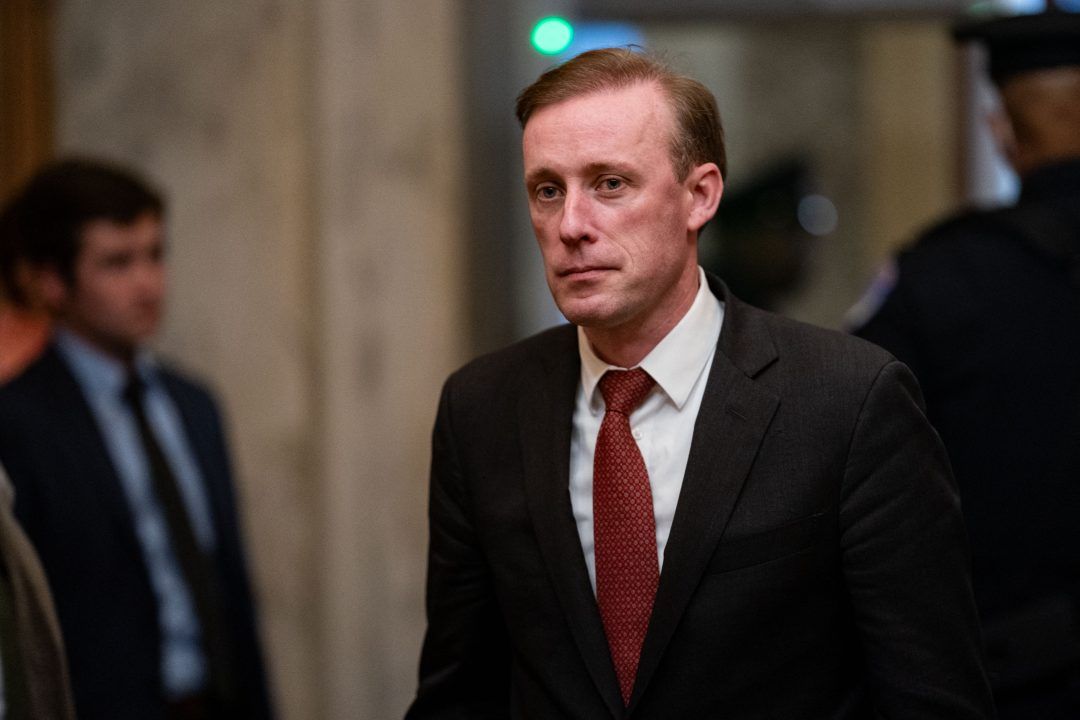- Home
- Middle East
- Top White House Official in China for Talks

©Nishimura / GETTY IMAGES NORTH AMERICA / Getty Images via AFP
US National Security Advisor Jake Sullivan arrived in Beijing on Tuesday to meet top diplomat Wang Yi for tense talks as China was embroiled in security rows with key American allies Japan and the Philippines.
On Monday, US treaty ally Japan scrambled fighters after a Chinese military aircraft's incursion into its airspace, which Tokyo called a "serious violation" of its sovereignty.
The Philippine defense chief accused Beijing on Tuesday of being the "biggest disruptor" of peace following a week of confrontations between the two countries.
Sullivan's plane landed at Beijing's Capital Airport just before 2:00 PM local time (0600 GMT), the video showed, with the top official greeted on the runway by US Ambassador to China Nicholas Burns.
Ahead of his trip, an American official said he would discuss the South China Sea with counterparts in Beijing.
She did not indicate whether the United States expected breakthroughs on the trip.
She said the US would press China on its mounting "military, diplomatic and economic pressure" on Taiwan, the self-ruling democracy that Beijing considers its territory and has not ruled out reunifying through force.
China has kept up its saber-rattling since the inauguration this year of President Lai Ching-te, whose party emphasizes Taiwan's separate identity.
Sullivan will also reiterate US concerns about China's support for Russia's defense industry expansion since its invasion of Ukraine.
Beijing counters that, unlike the United States, it does not directly give weapons to either side.
China has historically been eager to work with US national security advisors, seeing them as decision-makers close to the president who can negotiate away from the media spotlight that comes with the secretary of state or top leadership.
The modern US-China relationship was launched when Henry Kissinger, then national security advisor to Richard Nixon, secretly visited Beijing in 1971 to lay the groundwork for normalizing relations with the communist state.
Sullivan and Wang have met four times over the last year and a half – once in Washington and the other times in Vienna, Malta and Bangkok – as well as alongside Biden and President Xi Jinping at their November summit in California.
The meetings between Wang and Sullivan were sometimes announced only after they concluded, and the two had spent long hours together behind closed doors.
Sullivan's visit comes months before the US elections in November.
Oliver Hotham, with AFP
On Monday, US treaty ally Japan scrambled fighters after a Chinese military aircraft's incursion into its airspace, which Tokyo called a "serious violation" of its sovereignty.
The Philippine defense chief accused Beijing on Tuesday of being the "biggest disruptor" of peace following a week of confrontations between the two countries.
Sullivan's plane landed at Beijing's Capital Airport just before 2:00 PM local time (0600 GMT), the video showed, with the top official greeted on the runway by US Ambassador to China Nicholas Burns.
Ahead of his trip, an American official said he would discuss the South China Sea with counterparts in Beijing.
She did not indicate whether the United States expected breakthroughs on the trip.
She said the US would press China on its mounting "military, diplomatic and economic pressure" on Taiwan, the self-ruling democracy that Beijing considers its territory and has not ruled out reunifying through force.
China has kept up its saber-rattling since the inauguration this year of President Lai Ching-te, whose party emphasizes Taiwan's separate identity.
Sullivan will also reiterate US concerns about China's support for Russia's defense industry expansion since its invasion of Ukraine.
Beijing counters that, unlike the United States, it does not directly give weapons to either side.
China has historically been eager to work with US national security advisors, seeing them as decision-makers close to the president who can negotiate away from the media spotlight that comes with the secretary of state or top leadership.
The modern US-China relationship was launched when Henry Kissinger, then national security advisor to Richard Nixon, secretly visited Beijing in 1971 to lay the groundwork for normalizing relations with the communist state.
Sullivan and Wang have met four times over the last year and a half – once in Washington and the other times in Vienna, Malta and Bangkok – as well as alongside Biden and President Xi Jinping at their November summit in California.
The meetings between Wang and Sullivan were sometimes announced only after they concluded, and the two had spent long hours together behind closed doors.
Sullivan's visit comes months before the US elections in November.
Oliver Hotham, with AFP
Read more


Comments